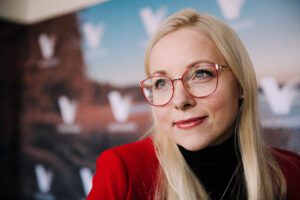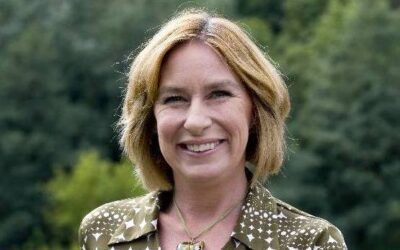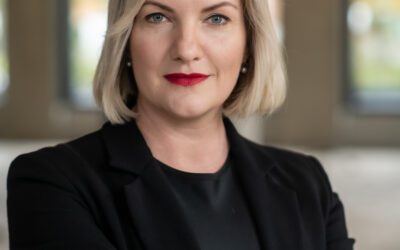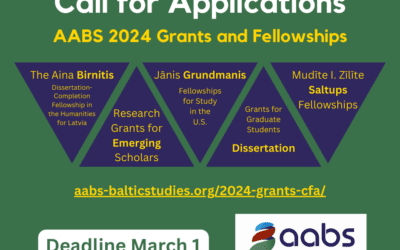
©Maarja Merivoo-Parro, 2023
Dr. Maarja Merivoo-Parro is dedicated to exploring the history of mentality and the crossroads of culture and politics. She divides her time between research, teaching, and work in the media. Dr. Merivoo-Parro has her own TV show “Center for Curiosity” and hosts the podcast “Estonia Explained” on news.err.ee. She is also active in the non-profit sector as a board member of Baltic Heritage Network and Estonian Diaspora Academy.
The Impact of an Award: Report from Maarja Merivoo-Parro
After the completion of her project, Maarja Merivoo-Parro submitted a reflection to AABS.
We thank her for her permission to publish her thoughts, which have been lightly edited.
Much has been written about the dissolution of the Soviet Union and the individual paths of Estonia, Latvia and Lithuania before, during and after regaining their independence. One factor which sets Estonia apart from others is the vast humanitarian effort by neighboring Finns who delivered food, medicine, clothes, toys and technology to Estonia.
This movement began in the late 1980s and carried over into the 1990s. My lived experience is that it gave people a “taste of freedom” in a very direct way. It not only helped to kindle the fire of pro-independence movements, but also provided a great starting position for the budding country and might account for some of the surprising success it has had during subsequent decades.
The fact that this spontaneous person-to-person humanitarian aid took place is well known and forms part of the basic narratives surrounding the history of late 1980s and early 1990s. Curiously, there is next to no research about this phenomenon in either Estonia or Finland.
More than thirty years have passed since the first contacts were made and some of the women and men in the front lines of this “diplomacy of the people” have begun to fade away. That’s why I felt I needed to go to the field and capture first hand accounts from the people who were actually working on the forefront as well as the people who were on the receiving end of the aid.
The AABS Emerging Scholar Grant was perfect for conducting a pilot study and zooming in on two localities at the heart of the exchange: Kuusalu in Estonia and Kouvola in Finland. In a way they represent a classic case of this twinning. Tentative personal contacts snowballed into a community-wide search for understanding and care. Schools signed cooperation pacts, kids became pen-pals, adults began joint ventures. Busloads of people went for short term exchange and stayed in each other’s homes.
For some, seeing life abroad up close gave them dreams. For others it gave purpose. This pivotal experience shaped the destiny of some participants and their whole life since has been with one foot in Estonia and the other in Finland.
I used the AABS grant for conducting oral histories on both shores with people who now are far apart but for a moment in time had formed a tight-knit international community against all odds. The iron curtain was still very much in place and Finland’s official policy was not as friendly or supportive as one might think.
The AABS grant also allowed me to dive into archival sources. I found the recently declassified presidential papers at the Finnish National Archives to be full of surprises and illumination pertaining to how Finland shaped its careful foreign policy during the Cold War.
The documents contain information about the many instances of criticism against Finland’s government by international organizations as well as other Scandinavian, European and North-American countries. Finland was seen as not pulling its weight, of being overly mindful of Soviet interests and not doing enough to support the Baltics on their way towards independence.
Perhaps this overwhelming popular response from Finnish citizens on their mission to help Estonians was influenced by the perceived lack of initiative by the government. The rationale might have been: if they won’t do it, I guess we should. At least that is what evidence from oral histories seems to hint at.
The pilot study focusing on the relationship between Kuusalu and Kouvola is an illuminating example of a wider phenomenon, which I hope to dive into with the help of future grants. One of the paths I wish to pursue is a simple scaling up and including other municipalities in both countries.
Another fascinating avenue is moving beyond qualitative research and trying to crunch the numbers. There are financial documents in archives which might shed light on the size of this twinning economy and its aftermath in the era of re-independent Estonia. After the borders fell, many Estonians went to work in Finland and it changed the traditional lay-out of our diaspora.
Since migration started in the 19th century, the country with the most Estonians outside of Estonia has always been Russia. Deportations and colonisations made sure that even the Great Escape of 1944 and subsequent communities in the free world never came close to the numbers of Estonians in Russian territories. This was still very much the case in the 1980s and 1990s when the spontaneous humanitarian aid from Finns to Estonians began. A decade later when Estonia joined the EU and many Estonians chose to work in Finland, it quickly became the host of the biggest Estonian community outside of Estonia.
Nobody can deny that this movement of labor along with remittances and commuting have a strong effect on both economies to this day. I would love to find out how it all unfolded over time and what exactly is the role of this neighborly relationship in Estonia’s success as a democratic country.
I hoped to begin the project in 2020, but the pandemic stopped me in my tracks. Finland was even more adamant about taking protective measures and it wasn’t until 2022 that I felt I could conduct the oral history interviews and travel from home to home without much hindrance. Right before I began, Russia invaded Ukraine and war broke out.
Until then I had perceived my topic to be a historic one showcasing the impact of citizens’ personal choices in shaping at-risk individuals and thus reinforcing democratic and socio-economic development. With thousands of Estonians now running to help Ukrainian people with medicine, food, clothes and shelter, it seems that they are in a way paying it forward. What Estonians seek to be for Ukrainians is similar to what Finns once were to Estonians.
My grass-root investigation into the untold history of cross-border cooperation can not only provide meaningful commentary on the cultural approach to the Cold War, but can have a deep impact on understanding regional history and the origin of current geopolitical realities as well as provide lessons for the future. If I succeed in funding the next stages of the research I believe this project has the potential to transcend the discipline of history and impact social studies, developmental studies, political science and economics.
– Maarja Merivoo-Parro, 2023
Maarja Merivoo-Parro
What is the Emerging Scholars Grant?
The Research Grant for Emerging Scholars is an award for up to $6,000, to be used for travel, duplication, materials, equipment, or other needs as specified. Proposals are evaluated according to the scholarly potential of the applicant and the quality and scholarly importance of the proposed work, especially to the development of Baltic Studies. Applicants must have received PhD no earlier than January 1, 2013. Applicants must be AABS members at the time of application.
The application deadline for academic year 2023-2024 is February 1, 2023. Applications will be evaluated by the AABS 2023–2024 Grants Committee consisting of AABS VP for Professional Development Dr. Kaarel Piirimäe, AABS President Dr. Dovilė Budrytė, and AABS Director-at-Large Dr. Daunis Auers. Award notifications will be made in April 2023.
Other Grants and Fellowships News
Vanished Lands: Book Publication Subvention Report by Laima Vincė Sruoginis
The Association for the Advancement of Baltic Studies (AABS) is pleased to recognized the successful conclusion of a Book Publication Subvention Grant awarded to Peter Lang Publishers for publishing the book Vanished Lands: Memory and Postmemory in North American...
Elīna Vikmane Birnitis Fellowship Report on Advancing Cybermuseology
AABS is pleased to recognize Elīna Vikmane for the completion of her dissertation "Advancing Cybermuseology: Diffusion of digital innovation in Latvia’s museum sector," for which she received the 2022–2023 Aina Birnitis Dissertation-Completion Fellowship in the...
AABS 2024 Grant and Fellowship Applications Open
Call for Applications AABS 2024-2025 Grants and Fellowships Research Grants for Emerging Scholars The Aina Birnitis Dissertation-Completion Fellowship in the Humanities for Latvia Mudīte I. Zīlīte Saltups Fellowships Jānis Grundmanis Fellowships for...



